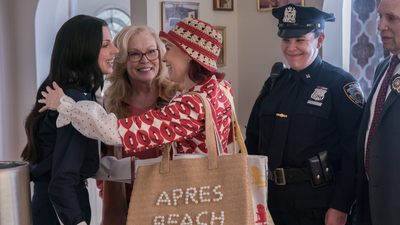
The Unsettling Charm of the Mundane: How Tony Hale Became a Creepy Mastermind in Elsbeth
Tony Hale, an actor beloved for his portrayal of lovable losers and endearingly awkward characters, has built a career on vulnerability and comedic timing. But in Elsbeth Season 3 Episode 6, titled [Insert Title Here – since you didn’t provide it], Hale subverts expectations and delivers a performance that cements him as one of the creepiest villains the show has seen yet. The episode masterfully leverages Hale’s established persona to create a chilling dissonance, proving that the most terrifying monsters are often those lurking beneath a veneer of normalcy.
What makes Hale’s character so unsettling isn’t any overt display of malice or theatrical villainy. Instead, it’s the creeping sense of unease he exudes through his quiet demeanor, the subtle manipulation woven into his seemingly innocuous actions, and the disturbing ordinariness of his motivation. He’s not a flamboyant Moriarty plotting world domination; he’s the unassuming neighbor, the helpful colleague, the friendly acquaintance – someone who, on the surface, seems utterly harmless. This carefully constructed facade of normalcy is precisely what makes him so effective and so deeply unsettling.
The genius of Hale’s performance lies in the subtle details. A slightly too-long pause, a fleeting flicker of darkness in his eyes, a calculatedly casual delivery of a veiled threat – these are the tools he uses to build a character that is both charming and profoundly disturbing. He doesn’t need to shout or rant to convey his menace; his power lies in the restraint, the control, the chilling awareness of the impact of his words and actions. It’s the kind of villainy that thrives on plausible deniability, a calculated game of cat and mouse where the true nature of his intentions is cleverly masked behind a facade of geniality.
Furthermore, the episode skillfully utilizes Hale’s comedic background to amplify the creepiness. His past roles often involve characters who are desperately trying to be liked, desperately trying to be helpful, even if they are inept or misguided. This ingrained expectation in the viewer’s mind makes his villainy all the more jarring. When he offers a seemingly kind gesture, we instinctively question its sincerity. Is it genuine concern, or a calculated move in his sinister game? This constant questioning, this uncertainty, is what elevates the character beyond a simple antagonist and into a figure of genuine dread.
Elsbeth, with her keen observations and unconventional methods, serves as the perfect foil for Hale’s character. She sees through the facade, noticing the subtle inconsistencies and the unsettling undercurrents in his seemingly harmless interactions. The interplay between them is a masterclass in tension, as Elsbeth slowly peels back the layers of his carefully constructed persona, revealing the darkness lurking beneath. The audience is left to grapple with the disturbing realization that beneath the pleasant exterior lies a cunning and ruthless individual, capable of inflicting harm with a chilling detachment.
In conclusion, Tony Hale’s portrayal of a seemingly ordinary villain in Elsbeth Season 3 Episode 6 is a testament to his versatility as an actor and the show’s ability to craft compelling narratives. By leveraging Hale’s established persona and focusing on the subtle nuances of his performance, the episode delivers a villain that is all the more chilling for his ordinariness. He reminds us that the true monsters are not always the ones who scream and rage, but often the ones who blend seamlessly into the background, hiding their darkness behind a mask of unassuming charm. This unsettling portrayal is a triumph for Hale, solidifying his position as a formidable actor capable of eliciting not just laughter, but genuine fear. It serves as a powerful reminder that the most terrifying things in life are often the things we least expect.
